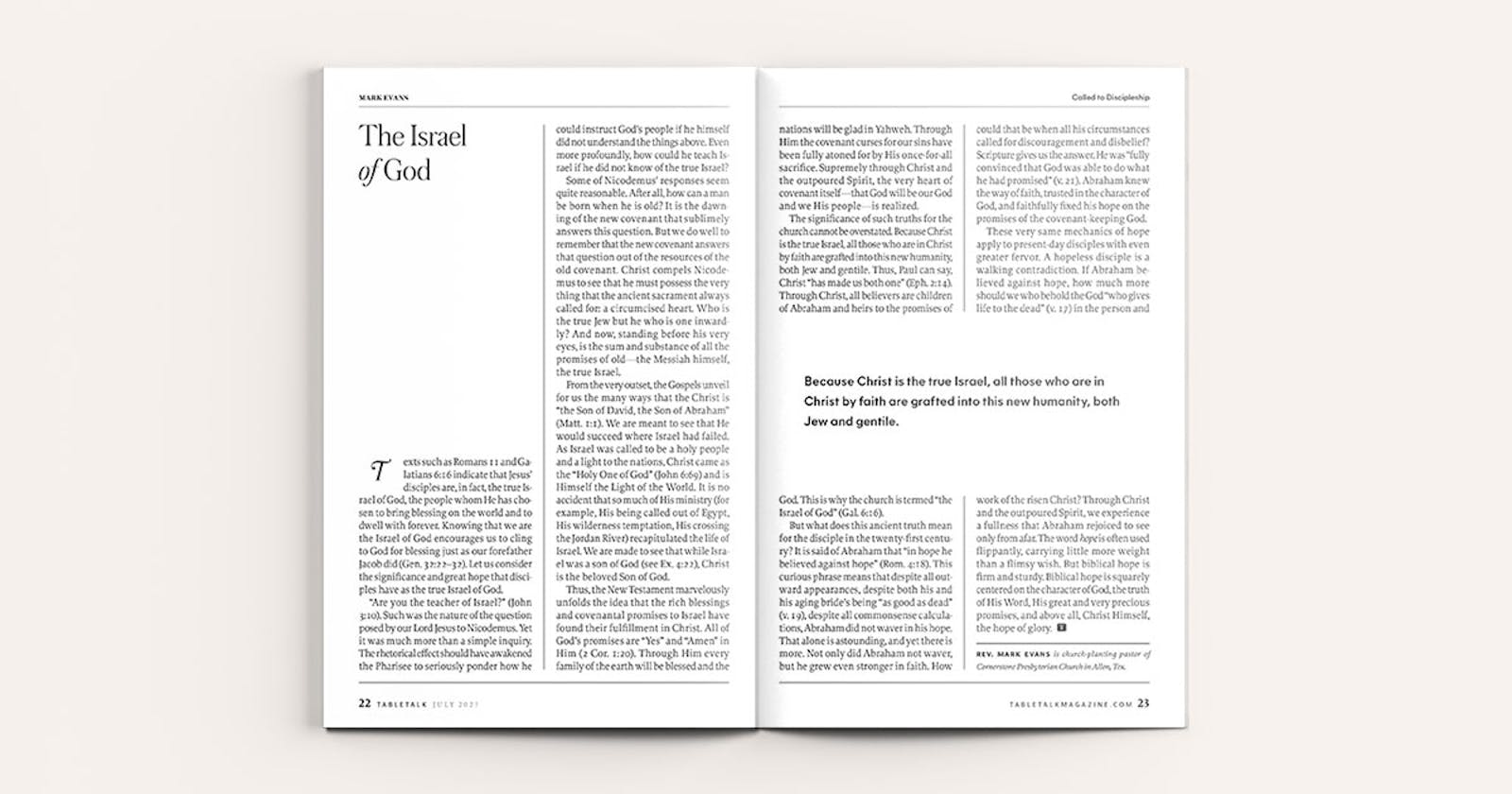
Request your free, three-month trial to Tabletalk magazine. You’ll receive the print issue monthly and gain immediate digital access to decades of archives. This trial is risk-free. No credit card required.
Try Tabletalk NowAlready receive Tabletalk magazine every month?
Verify your email address to gain unlimited access.
Texts such as Romans 11 and Galatians 6:16 indicate that Jesus’ disciples are, in fact, the true Israel of God, the people whom He has chosen to bring blessing on the world and to dwell with forever. Knowing that we are the Israel of God encourages us to cling to God for blessing just as our forefather Jacob did (Gen. 32:22–32). Let us consider the significance and great hope that disciples have as the true Israel of God.
“Are you the teacher of Israel?” (John 3:10). Such was the nature of the question posed by our Lord Jesus to Nicodemus. Yet it was much more than a simple inquiry. The rhetorical effect should have awakened the Pharisee to seriously ponder how he could instruct God’s people if he himself did not understand the things above. Even more profoundly, how could he teach Israel if he did not know of the true Israel?
Some of Nicodemus’ responses seem quite reasonable. After all, how can a man be born when he is old? It is the dawning of the new covenant that sublimely answers this question. But we do well to remember that the new covenant answers that question out of the resources of the old covenant. Christ compels Nicodemus to see that he must possess the very thing that the ancient sacrament always called for: a circumcised heart. Who is the true Jew but he who is one inwardly? And now, standing before his very eyes, is the sum and substance of all the promises of old—the Messiah himself, the true Israel.
From the very outset, the Gospels unveil for us the many ways that the Christ is “the Son of David, the Son of Abraham” (Matt. 1:1). We are meant to see that He would succeed where Israel had failed. As Israel was called to be a holy people and a light to the nations, Christ came as the “Holy One of God” (John 6:69) and is Himself the Light of the World. It is no accident that so much of His ministry (for example, His being called out of Egypt, His wilderness temptation, His crossing the Jordan River) recapitulated the life of Israel. We are made to see that while Israel was a son of God (see Ex. 4:22), Christ is the beloved Son of God.
Thus, the New Testament marvelously unfolds the idea that the rich blessings and covenantal promises to Israel have found their fulfillment in Christ. All of God’s promises are “Yes” and “Amen” in Him (2 Cor. 1:20). Through Him every family of the earth will be blessed and the nations will be glad in Yahweh. Through Him the covenant curses for our sins have been fully atoned for by His once-for-all sacrifice. Supremely through Christ and the outpoured Spirit, the very heart of covenant itself—that God will be our God and we His people—is realized.
The significance of such truths for the church cannot be overstated. Because Christ is the true Israel, all those who are in Christ by faith are grafted into this new humanity, both Jew and gentile. Thus, Paul can say, Christ “has made us both one” (Eph. 2:14). Through Christ, all believers are children of Abraham and heirs to the promises of God. This is why the church is termed “the Israel of God” (Gal. 6:16).

But what does this ancient truth mean for the disciple in the twenty-first century? It is said of Abraham that “in hope he believed against hope” (Rom. 4:18). This curious phrase means that despite all outward appearances, despite both his and his aging bride’s being “as good as dead” (v. 19), despite all commonsense calculations, Abraham did not waver in his hope. That alone is astounding, and yet there is more. Not only did Abraham not waver, but he grew even stronger in faith. How could that be when all his circumstances called for discouragement and disbelief? Scripture gives us the answer. He was “fully convinced that God was able to do what he had promised” (v. 21). Abraham knew the way of faith, trusted in the character of God, and faithfully fixed his hope on the promises of the covenant-keeping God.
These very same mechanics of hope apply to present-day disciples with even greater fervor. A hopeless disciple is a walking contradiction. If Abraham believed against hope, how much more should we who behold the God “who gives life to the dead” (v. 17) in the person and work of the risen Christ? Through Christ and the outpoured Spirit, we experience a fullness that Abraham rejoiced to see only from afar. The word hope is often used flippantly, carrying little more weight than a flimsy wish. But biblical hope is firm and sturdy. Biblical hope is squarely centered on the character of God, the truth of His Word, His great and very precious promises, and above all, Christ Himself, the hope of glory.
